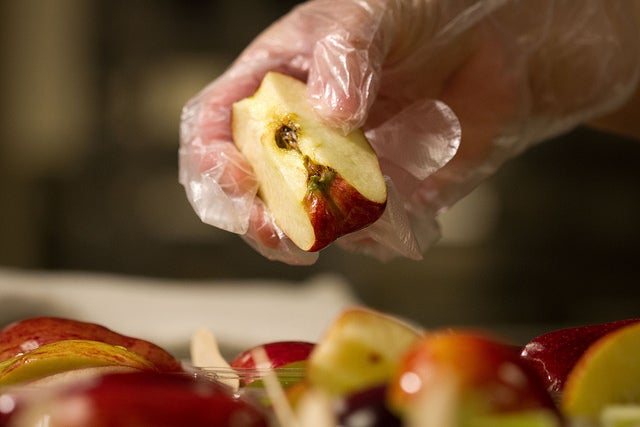EPA Ignores Evidence Chlorpyrifos Causes Permanent Damage To Children’s Brains
Agency fudges the numbers to keep chlorpyrifos in our food
Contact
The Environmental Protection Agency (EPA) announced it is rejecting extensive scientific evidence that even low levels of the pesticide chlorpyrifos damages children’s brains. In its third risk assessment on chlorpyrifos published Monday, EPA is rejecting years of established science saying the science addressing the pesticide’s “neurodevelopmental effects remains unresolved,” as it tries to keep a widely used toxic pesticide in fruits and vegetables, as well as feed crops that lead to residues in milk, eggs, and meat.
“The EPA is ignoring decades of science by leading universities and in doing so, it’s neglecting its duty to protect children from pesticides,” said Patti Goldman, Earthjustice managing attorney. “Ignoring the demonstrated harm to children doesn’t make chlorpyrifos safe, it just shows a commitment to keep a toxic pesticide in the market and in our food at all cost.”
Chlorpyrifos is just one of dozens of organophosphates (OP) pesticides linked with damage to the developing brains of children. A growing body of evidence shows that prenatal exposure to very low levels of chlorpyrifos — levels far lower than what EPA used to set regulatory limits — harms babies permanently. Studies show that exposure to chlorpyrifos, and other OP pesticides during pregnancy, is associated with lower birth weight, attention deficit disorders, autism spectrum disorder, reduced IQ, and loss of working memory.
Peer-reviewed studies that have tracked real-world exposures of mothers and their children to chlorpyrifos have associated the pesticide with this type of permanent damage. But EPA is now questioning the studies because it says researchers cannot release the raw data without infringing on the privacy of the study participants.
The new risk assessment also means farmworkers will be less protected and fewer uses will be deemed unsafe. Previous risk-assessments showed workers are at risk even with the most protective equipment. EPA has rejiggered the numbers to reduce the number of uses requiring additional worker protections and elimination of the exposures.
EPA documents show that Corteva, the largest producer of chlorpyrifos, has been lobbying the EPA. The office of Chemical Safety and Pollution Prevention that Alexandra Dunn — a Trump appointee — leads, is in charge of the risk assessment.
In December 2014, EPA released a risk assessment finding unsafe drinking water contamination from chlorpyrifos and it proposed to ban chlorpyrifos from food in November 2015. In November 2016, EPA released a revised human health risk assessment for chlorpyrifos that confirmed that chlorpyrifos is unsafe in food and pesticide drift, in addition to drinking water, with toddlers exposed to 40 times safe levels. The Trump administration stopped the process, triggering a series of lawsuits by Earthjustice on behalf of dozens of farmworker and health groups. In July of 2019 EPA responded to a court deadline by again refusing to ban chlorpyrifos from food. Earthjustice’s challenge to that decision was argued in the Ninth Circuit Court of Appeals in July 2020 and we are awaiting a decision.
Meanwhile, states have been stepping in. California issued two risk assessments finding chlorpyrifos unsafe. Corteva challenged California’s cancellation order but settled by agreeing to end 99% of chlorpyrifos uses in the state. In February 2020, Corteva announced that it would stop manufacturing and selling chlorpyrifos. Yet it continues to lobby EPA.
For its part, the Trump administration disregards science and independent scientists constantly.
This year its EPA is finalizing its “Censoring Science Rule,” which is designed to block epidemiological studies. Earthjustice is pushing back against this rule and other anti-science efforts. In fact, Earthjustice sued EPA for excluding independent scientists from its advisory boards, and claiming that publicly funded academic scientists have a disqualifying conflict of interest while allowing scientists paid by polluting industries to serve. The D.C. Circuit ruled in April that this directive is illegal.

Additional Resources
About Earthjustice
Earthjustice is the premier nonprofit environmental law organization. We wield the power of law and the strength of partnership to protect people's health, to preserve magnificent places and wildlife, to advance clean energy, and to combat climate change. We are here because the earth needs a good lawyer.